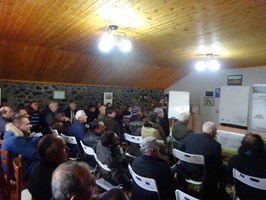Created Pukë – Fushë Arrëz Breeders Association
After the fall of Enver Hoxha’s authoritarian regime, the District of Puka, in northern Albania, has lived through extreme depopulation. In comparison with the early ‘90s, the number of inhabitants practically halved, deeply affecting the socio-economic fabric of the area. Puka was soon peripheral in the newly democratic Albanian state, both due to the harsh terrain and the weakness of the newborn institutions.
In parallel, unrestrained woodland exploitation and abrupt discontinuation of state oversight on mountain resources endangered the few activities local households could count on for their sustenance. Among these, wild berries and mushroom collection, beekeeping, and ovicaprine breeding.
Today, technical and financial support provided by the Project is raising hopes and motivating local breeders who endured such long and unforgiving transformation, as testified by a tiny, yet significant story of grassroots cooperation. In late 2018, a group of farmers that had previously received a small grant voiced an unexpected request: they wanted to formalise their position and attempt establishing a local breeders association.
The initiative may look unimportant, but it is definitely not. Massive emigration, the consequences of communist forced collectivisation, and the coming-back of old and previously repressed conflictual practices (see the notorious custom of ‘revenge’) deeply disrupted the social fabric at the basis of local mountain communities. In this context, therefore, any cooperative endeavour is looked upon with extreme diffidence, representing a paramount obstacle to breaking the cycle of poverty that affects the area. With this in mind, the will of the farmers involved in the Project is a remarkable signal of hope for the future.
Accordingly, the Project has provided its support to the first embryo of the association, ten breeders of Puka, in their attempt to spread knowledge of their initiative to other local farmers through various coordination and dissemination meetings. Some months later, the to-be association collected the backing of thirty breeders, laying the foundations for its eventual formalisation. Two working-groups elaborated the statuary provisions and the ‘face’ of the new entity, electing a governing board featuring seven representatives from different villages, as well as President and Vice-President. Eventually, Pukë – Fushë Arrëz Breeders Association was officially established in July 2019.
“I have been working in the breeding sector throughout my life, so that I am particularly moved in announcing that we managed to kick-off this joint initiative for the good of our sector and our territory,” says Gzim Laçi, veterinary and President of the Association. “It is not going to be an easy task to convince people about the benefits our association can bring to the area, but we are determined to work in that direction regardless of the many obstacles we have been facing for many years.” Among the first activities, besides holding meetings to discuss the most pressing issues, the Association took part in the organisation of a study visit to goat farms of a neighbouring region, involving most of its members.
Consequences of the long post-authoritarian transformation have strongly affected the area of Puka. Although central institutions signalled increased commitment to improve the situation, initiatives such as the one of this group of resolute farmers are crucial to strengthen the hopes of this territory. Emilia-Romagna’s renowned model of rural development can teach a lot to local actors and the newborn association had the chance to approach it thanks to the organisations involved in this Project.

